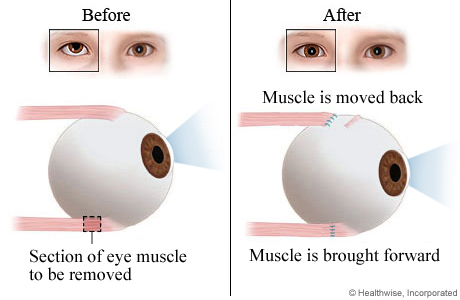Strabismus
Definition
Strabismus - is a recurrent or permanent deviation of one or another eye from the common fixation direction.
Eye can deviate inwards (converging strabismus), outwards (diverging strabismus), upwards or downwards depending on the type of strabismus. Strabismus is not only a cosmetic issue, it also hinders from feeling spatial environment. If strabismus starts in adults or in children in later years, usually there are complaints about double vision. In cases when strabismus starts in early childhood, and there is strabismus in one eye only, it can result in impaired vision development of this eye. It is related to the fact that the child's CNS learns to ignore the information sent by the squinting eye, as a result, the baby does not learn to use this eye which leads to ambliopia.
Causes
As there are various types of strabismus, it may also have various causes. The most common causes of strabismus:
- Genetically inherited, idiopathic;
- Refractive, related to high degree hypermetropia (farsightedness);
- Strabismus related to decreased vision in the respective eye (vision is very poor in one eye due to some reasons, therefore people cannot "control" this eye, it starts squinting);
- CNS issues related to eye movement muscle (pareses);
- Anatomic properties of eye movement muscle, orbit;
- General disease (e.g., myastenia, Graefe syndrome, etc.).
Treatment
- Treatment of strabismus depends on the type, amount and cause of strabismus.
- Refraction correction using glasses or contact lenses (more common if the cause of strabismus is high degree farsightedness);
- Treatment of ambliopia (e.g. correction using glasses and occlusion of the eye with better vision to "train" the lazy eye);
- Treatment of a general disease (e.g., myastenia);
- Less common - eye movement exercises (e.g., convergence training in case of diverging strabismus);
- Surgical treatment.
Eye movement muscles are operated during strabismus correction surgery. The muscle whose activity is too strong is relaxed (recessed) during the surgery, and the muscle whose activity is too weak is enhanced (resected). The strabismus correction surgery is usually performed under general anaesthesia. Sometimes several surgeries are necessary to achieve the desired result. The time when the strabismus correction surgery can be planned depends on the type and amount of strabismus, sharpness of vision, patient's age and general health state.





